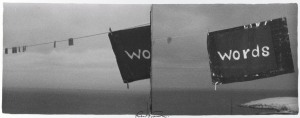“Dad, are you living or dead..ing?” son asks at dinner (aged 9).
Characteristic pause…”Well, both,” I reply.
How could it be otherwise? I’ve stayed the course, exercised my body, prepared a meal, feeling fine, alone, aware…and comes the call: “Living or dead..ing?” Parental response – stop. [Why is he asking? What is he thinking? How is he feeling? Bodily signs? Follow the language – “living or dead…dead..ing…dying.” What is called for here?] He thinks the living dead a lot, so I respond directly: “Well, both, and how could it be otherwise? I couldn’t very well be dying if I wasn’t alive, no? And the process of dying is constructed of living, yes? So it’s all in one moment I s’pose.”
We move on.
But I don’t. Not so much. It’s a good question.
It reminds me why I’m a philosopher, a poet. Why we tend toward the same, differently. We watch for the shared, the communal in our experience, anywhere. We work the same queries. In a living ruled by science, by probabilities and hypothetical cause, by vague notions of what-might-happen-next given conditions and dynamically complex systems…philosophers, poets and artists tend to seek out what’s certain – what is nevertheless the case: we feel, we think, we live, we die, a world is there – the details change with the order of the day. Or night. The language or discipline. The methods or culture, practice or beliefs. Depending on the questions. Who’s asking and how.
We happen – become – and unhappen.
Because my dad, almost 80, evinces this. Because I’ll be half-90 in 48 hours. What I asked for is called Cosmic Pessimism, which says something. I happen…vary…and stop happening that way. How that occurs, what and who and when and why change nearly as quickly as we do. Should I say, what we think or believe occurs? Rationalization of experience.
Reminds me of this, of the action of writing.
I still can’t do it “live.” Can’t inscribe it as a “post” or a “tweet” or a “message.” I’ve got to get some static. IN-scribe is a physical act of scratching, digging, carving in clay. ON-scribing is more what we do – laying down ink, pounding down letters, playing with light. Writing with materials like paper and ink relatively makes something stay put for awhile. So we can revise. Perhaps that’s all Rilke meant – give yourself the opportunity to edit, erase, respond to your action before you present it. Is revision revivification? Stay something, pause. Apply yourself to your living and choose an occurrence. Does this wrinkle the union of living and dying?
At work I’m struggling with teaching the methods of multi-disciplinary research. How to template a strategy of awareness to potentially everything? We’re living and dying and attempting to know, understand, RATIONALIZE something about that. Literally ANYthing applies, or may nourish, correct, influence or direct that essential inquiry (and DOES!). How does one know where to look? How does one know how to live it? How does one know what one needs? To synthesize rationalizations from multiple fields and methods and practices. To compare all the answers or theories or thoughts? To differentiate results and observations coming from various humans and schools and materials and tools and contexts and set-ups and the myriad messiness of living/dying organisms in relations beyond our control?
“You must revise your life” (Rainer Maria Rilke).
Revising your dying. Is it possible to live moments in such a way that they outstrip the correlative dying? To live more than die? Once in awhile? I think we have experiences, moments, in which we feel more alive than in others. “Are you living or dead…ing” he asks. Well, waking into a maze to traverse every day – cleaning and feeding and playing the roles (father, lover, employee, friend, son, writer, scholar, blogger, house-owner, house-keeper, cook, playmate, librarian, instructor, male, man, person, reader, and so on), shopping and feeding and listening and nourishing and working and running to tire – feels a bit more like “dead…ing.” But there are moments! Times. “Events,” we call them (I guess). Twistings and turnings and something like gathered occurrences, Being + Well-Being, Whitehead might say. A more spectacular death I suppose. Perhaps elevated experiences of living just heighten the jouissance of death?
I don’t know.
We happen – become/unbecome – and unhappen.
The marks left from that – our inscriptions, palimpsests and paths. Veined. Seared-in. Scored. In some cases, welded – some cases cancelled, erased, blotted out. Living-dead…ing. Vice versa?
To edit, revise, pause – is it possible? What did he mean? What might it mean? Curving back doesn’t alter the time. Going over is still going forth. We wend and wind and whirl and reveal we are living and dying.


